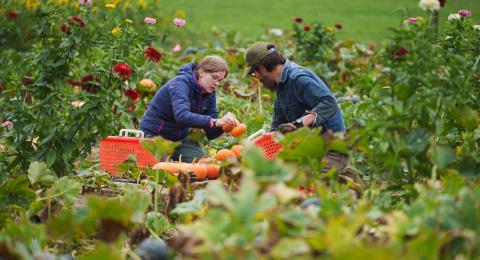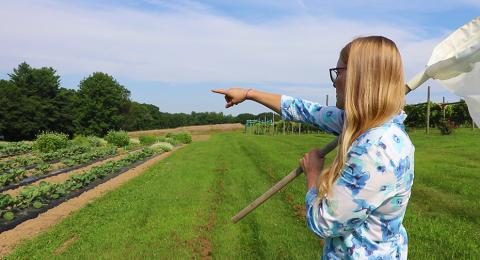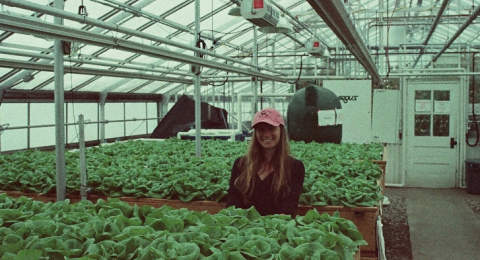Why get your master’s degree in agricultural sciences?
An M.S. in agricultural sciences will help you advance your career in an agriculture-related field, whether you are working in agricultural production, agribusiness, policy areas in government or nonprofit sectors, education and/or research. Our master’s program focuses on the advanced study of plant and animal agriculture, aquaculture, agro-ecosystems, and the social and economic dimensions of food production and distribution systems. With the growing demand for well-trained agricultural researchers and professionals, a master’s degree in agricultural sciences will help you pursue leadership roles in collaborative and interdisciplinary initiatives that address agricultural issues and opportunities.
Why choose UNH for your degree?
UNH is among the nation’s highest-performing research universities, having earned a Carnegie Classification R1. Our research portfolio brings in more than $110 million in competitive external funding each year. Federal and state funding is available for research on diverse aspects of sustainable agriculture, foods and agricultural sciences. You’ll have the opportunity to partner with state and regional growers and producers and collaborate with leading researchers worldwide. As a graduate student at UNH, you’ll have the opportunity to work in several top-notch teaching and research facilities, including the New Hampshire Agricultural Experiment Station, one of the university’s largest research organizations.
Potential career areas
- Agribusiness
- Commercial plant/animal production
- Research
- Private consulting
- Education and Extension
- Farming
- Government/regulatory
- Policy making
- Nonprofit sector
Curriculum & Requirements
The Master of Science (M.S.) in Agricultural Sciences graduate program offered by the Department of Agriculture, Nutrition, and Food Systems (ANFS) offers a flexible course of study that provides education and research experience in plant and animal agriculture, aquaculture, food systems, and related fields.
Emphasis is placed on acquiring basic and practical knowledge and research experience in one of the following core emphasis areas:
- Diverse components of plant and animal agricultural systems including breeding and genetics, nutrition, physiology, environmental interactions, organismal health, agroecology, and pathology. Students may also focus on production systems, including field-based and post-harvest practices.
- Food systems analysis to address the social, economic, and environmental relationships that shape outcomes in plant and animal agricultural systems. Students work on food and agriculture related questions and challenges ranging from food production, processing, aggregation and distribution, access, consumption, and management of food waste.
The agricultural sciences graduate program prepares students to become highly knowledgeable and competent in professional fields related to agriculture and food, and leaders in collaborative and interdisciplinary efforts to address local, regional, national and/or global issues at the intersection of agriculture, food and the environment.
The M.S. program is thesis-based, with the expectation of providing substantial research experience and the opportunity to publish new knowledge in the field of interest.
Master of Science (M.S.) in Agriculture Sciences students plan a program of study in conjunction with their advisor and Master’s Thesis Committee, including required courses and competencies. A minimum of 30 graduate credits, including 6-10 research credits (ANFS 899 Master's Thesis), are required. A thesis proposal is developed within the first year for approval by the thesis committee. All M.S. students must write a thesis which must be accepted by the advisor(s), committee members, and the Graduate School. The degree is completed when the student has completed the required coursework, presented and passed a thesis defense, and the thesis is approved by the Master’s Thesis Committee and accepted by the Graduate School.
Up to 8 credits of graduate credit from another institution may be transferred, provided the credits were not counted toward another degree, and the course grade was a B or higher. Petitions requesting transfer credit must be supported by the advisor and graduate committee and approved by the UNH Graduate School
1. Core Course Requirements:
| Code | Title | Credits |
|---|---|---|
| ANFS 899 | Master's Thesis | 6-10 |
| ANFS 901 | Introduction to Agriculture, Nutrition, and Food Systems Graduate Studies 1 | 1 |
| ANFS 997 | Agriculture, Nutrition, and Food Systems Seminar 2 | 1 |
- 1
To be taken at the earliest opportunity, typically in the initial fall semester of the graduate program.
- 2
This 1 credit course may be repeated up to a maximum of 4 credits and should be taken every semester by M.S. students.
2. Competency Requirements: In addition to the core required courses, students will be expected to demonstrate competency in areas of experimental design and analysis, and in scientific writing and communication. Students must take at least one course from each competency. The competencies may be fulfilled by courses chosen in consultation with the advisor and committee. Depending on the student, one or both of these competency requirements may have been fulfilled through other course work or professional experience as approved by the committee and ANFS graduate coordinator.
| Code | Title | Credits |
|---|---|---|
| Communication Competency | ||
| Select at least one course: | ||
| BIOL 902 | Writing and Publishing Science | 2 |
| NR 905 | Grant Writing | 2 |
| BIOL 950 | Scientific Communication | 2 |
| Experimental Design and Analysis Competency | ||
| Select at least one course: | ||
| ANFS 933 | Design, Analysis, and Interpretation of Experiments | 4 |
| SOC 902 | Sociological Methods II: Research Design | 4 |
3. Electives: Each student, in consultation with their graduate committee, will define one or more areas of informal specialization, and will take additional courses appropriate for their area(s) of specialization.
4. Additional Requirements:
- All students in the Agricultural Sciences Graduate Programs are expected to present their research in ANFS departmental seminar at least twice (including the thesis defense seminar). Students are also encouraged to present at professional conferences and acquire teaching and/or mentoring experience.
- Written and oral defense of research proposal. Approval form must be on file with department.
- Thesis
Additional Information:
Additional information can be found in the program graduate handbook, which includes expectations, guidelines, and detailed policies.
Annual Evaluation: The annual evaluation of graduate students ensures that students receive the mentorship they deserve and are making progress toward completion of their degrees. The annual evaluation of graduate students consists of a collaborative effort between faculty adviser and student to:
- Complete a self-assessment;
- Present a professional quality CV suitable for awards, job applications, and internships;
- Produce a narrative of service or other activities not captured on a CV;
- Develop annual goals.
Program Learning Outcomes
Students graduating with an M.S. in Agricultural sciences will meet objectives in the following areas:
Discipline specific knowledge
- Identify and explain discipline specific research methods
- Build knowledge and understanding in key areas of agricultural sciences including food systems, and animal and plant-based agricultural production systems
Research design and analysis
- Apply appropriate study design to answer a research question
- Use appropriate statistical methods to analyze and interpret research results
Scientific method
- Develop, defend, and execute a research idea to advance knowledge in the student’s specific field of study
Critical thinking
- Ability to collect and critically evaluate information from the primary research literature to expand knowledge of agricultural and food systems
- Develop skills to critically evaluate and analyze their research data
Communication
- Communicate effectively in writing through the development of an argument supported by evidence
- Communicate effectively in oral formats when addressing project-specific research and agriculture and food related issues
- Convey research results in written and oral format to both professionals and the public
Professionalism
- Conduct research in an ethical manner
- Deliver professional oral and written communications
- Demonstrate collaboration and leadership skills
Deadlines
Applications must be completed by the following deadlines in order to be reviewed for admission:
- Fall: Jan. 15 (priority*), Aug. 1 (final) *Applications completed by Jan. 15 will be given priority consideration for admission and financial support. Applications completed after Jan. 15 will be considered based on openings and funding.
- Spring: Oct. 15 (final)
- Summer: N/A
- Special: N/A
Application fee: $65
Campus: Durham
New England Regional: MA RI
Accelerated Masters Eligible: No
New Hampshire Residents
Students claiming in-state residency must also submit a Proof of Residence Form. This form is not required to complete your application, but you will need to submit it after you are offered admission, or you will not be able to register for classes.
Transcripts
If you attended UNH or Granite State College (GSC) after September 1, 1991, and have indicated so on your online application, we will retrieve your transcript internally; this includes UNH-Durham, UNH-Manchester, UNH Non-Degree work and GSC.
If you did not attend UNH, or attended prior to September 1, 1991, then you must upload a copy (PDF) of your transcript in the application form. International transcripts must be translated into English.
If admitted, you must then request an official transcript be sent directly to our office from the Registrar's Office of each college/university attended. We accept transcripts both electronically and in hard copy:
- Electronic Transcripts: Please have your institution send the transcript directly to grad.school@unh.edu. Please note that we can only accept copies sent directly from the institution.
- Paper Transcripts: Please send hard copies of transcripts to: UNH Graduate School, Thompson Hall- 105 Main Street, Durham, NH 03824. You may request transcripts be sent to us directly from the institution or you may send them yourself as long as they remain sealed in the original university envelope.
Transcripts from all previous post-secondary institutions must be submitted and applicants must disclose any previous academic or disciplinary sanctions that resulted in their temporary or permanent separation from a previous post-secondary institution. If it is found that previous academic or disciplinary separations were not disclosed, applicants may face denial and admitted students may face dismissal from their academic program.
Letters of recommendation: 3 required
Recommendation letters submitted by relatives or friends, as well as letters older than one year, will not be accepted.
Personal Statement/Essay Questions
Prepare a brief but careful statement regarding:
- Reasons you wish to do graduate work in this field, including your immediate and long-range objectives.
- Your specific research or professional interest and experiences in this field.
Important Notes
Applicants should visit the Agricultural Sciences program website and review the list of faculty in their area of interest. The applicant should contact potential faculty advisors to discuss their interests and determine whether the faculty member(s) may be willing and able to serve as the student’s advisor before applying to the program. See the Agricultural Sciences Faculty List for a current list of faculty.
All applicants are encouraged to contact programs directly to discuss program specific application questions.
International Applicants
Prospective international students are required to submit TOEFL, IELTS, or equivalent examination scores. English Language Exams may be waived if English is your first language. If you wish to request a waiver, then please visit our Test Scores webpage for more information.
Explore Program Details
-
ASSOCIATE DEAN FOR RESEARCH, COLSA
DIRECTOR, NH AGRICULTURAL EXPERIMENT STATION
ProfessorEmail: Anton.Bekkerman@unh.eduPhone: (603) 862-1676 -
ProfessorProgram Coordinator - Applied Animal ScienceEmail: Drew.Conroy@unh.eduPhone: (603) 862-2625
-
Assistant ProfessorAssistant Professor of Plant BreedingPhone: (603) 862-1368





















